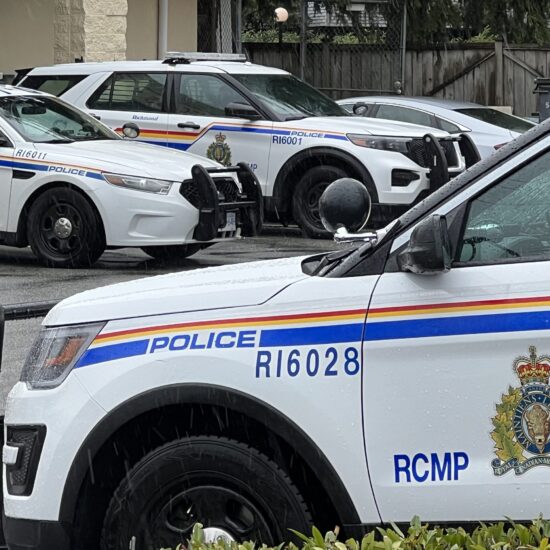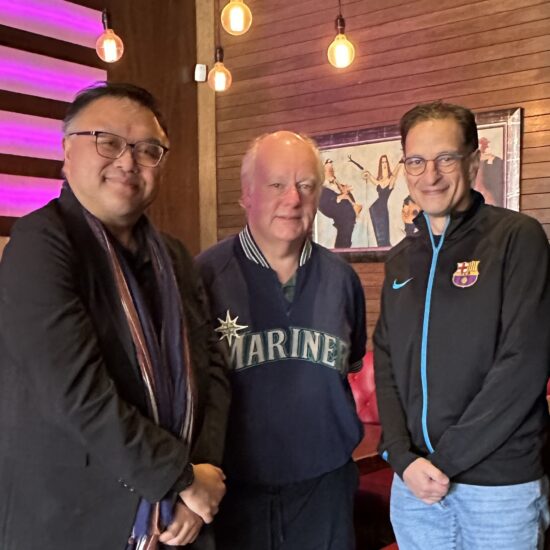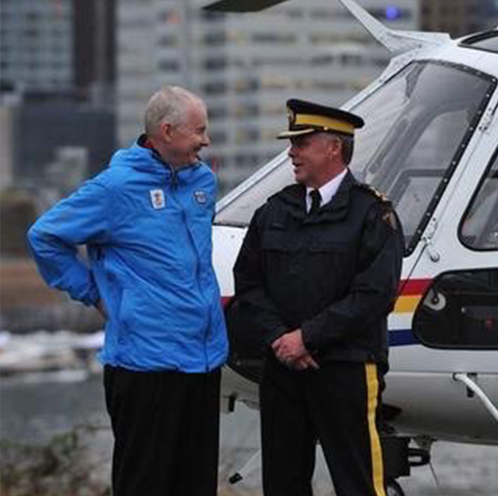
Bob Mackin (Updated June 30)
Documents filed June 29 with the Canadian Human Rights Tribunal allege the former CEO of the Vancouver 2010 Winter Olympics got special treatment from the RCMP and that the force discriminated against the indigenous men and women who claimed to be childhood victims of John Furlong.
Six members of the Lake Babine Nation are accusing the RCMP of racism and bias in a case that the Canadian Human Rights Commission decided in January would proceed to the tribunal. Hearing dates are pending.
In the complainants’ statement of particulars, Cathy Woodgate, Richard Perry, Dorothy Williams, Ann Tom, Maurice Joseph and Emma Williams claim they suffered discrimination by the RCMP contrary to the Canadian Human Rights Act. They also claim the RCMP protected Furlong because the Mounties were assigned the $900 million task of securing the Games.

John Furlong (left) and RCMP Olympic security head Bud Mercer in 2010 (BudMercer.ca)
“The complainants’ claim is about the RCMP’s investigation into their experiences of childhood abuse in Northern British Columbia, but it represents the experiences of many other indigenous people nationwide,” said the filing from London, Ont. human-rights lawyer Karen Bellehumeur.
“This case also demonstrates how the protection of powerful individuals serves to exacerbate the discrimination of oppressed groups.”
The filing explains how Beverley Abraham gave a statement to a constable in July 2012 at the Burns Lake detachment, but the file was transferred to Cpl. Quinton Mackie at Prince George because Burns Lake was short-staffed. Abraham was a former student at Immaculata Elementary School in Burns Lake when Furlong first came to Canada from Ireland, as a volunteer gym teacher with a Catholic lay group called the Frontier Apostles.
“Ms. Abraham had alleged the abuse occurred in 1969-70, but the Olympic CEO had written a biography and given many speeches in which he said he arrived in Canada in 1974,” the filing says. “Sgt. Beson reported back that there had been no security clearance done on the CEO. RCMP files show Cpl. Mackie did not ever ask the VANOC CEO why he said he came to Canada in 1974, five years after he had actually arrived, which was 1969.”
Abraham was among 22 former Immaculata and/or Prince George College students interviewed by Ontario journalist Laura Robinson for her Sept. 27, 2012 expose on Furlong in the Georgia Straight (“John Furlong biography omits secret past in Burns Lake”). Robinson found numerous omissions and inconsistencies in Furlong’s 2011-published memoir, Patriot Hearts.
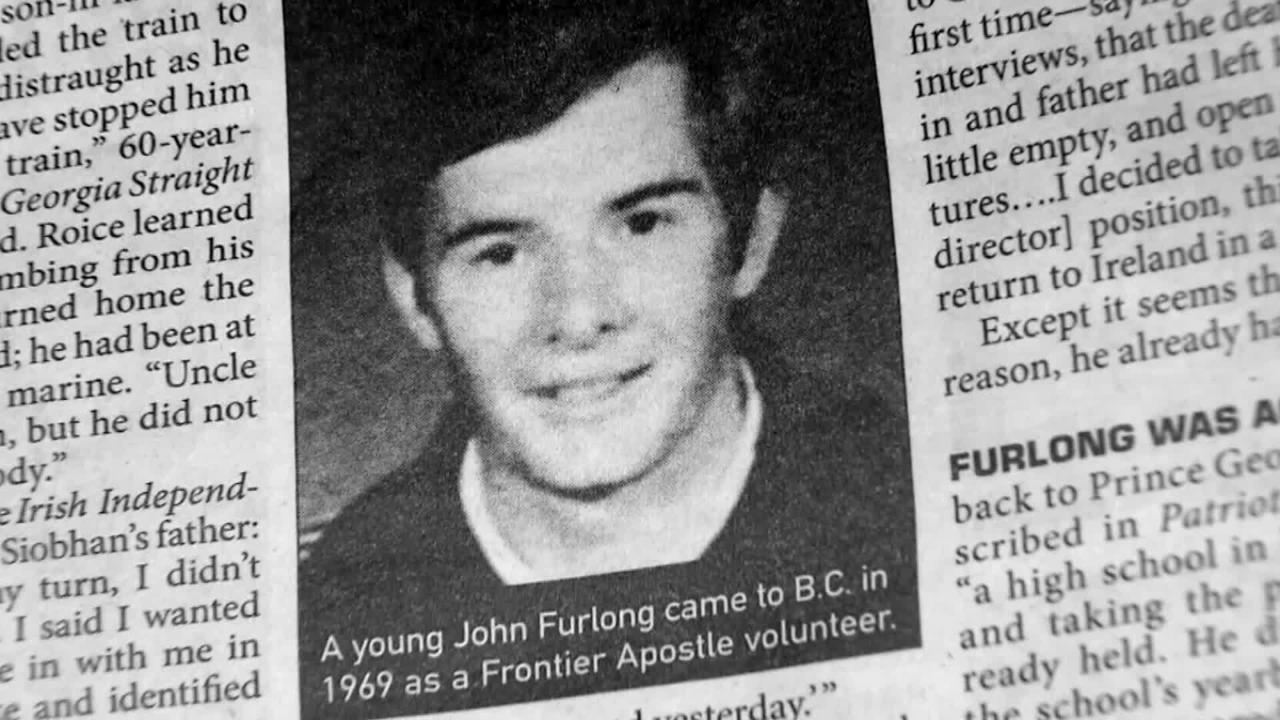
Laura Robinson’s expose in the Georgia Straight, Sept. 27, 2012.
Furlong has always denied the abuse allegations. None of the allegations has been tested in a criminal or civil court. He filed defamation lawsuits in B.C. Supreme Court against the Georgia Straight and Robinson in late 2012, but later withdrew them. Robinson lost her defamation case against Furlong in 2015.
The filing mentions that The Tyee reported Sept. 27, 2012 that Furlong’s co-writer, Globe and Mail columnist Gary Mason, said he had never been told about Furlong’s time in Burns Lake. According to documents obtained by the complainants, Mackie met on Oct. 23, 2012 with Furlong, his lawyer Marvin Storrow and Andrea Shaw, a former VANOC vice-president and founder of the TwentyTen Group sports marketing firm.
“Cpl. Mackie’s notes show that the VANOC CEO mentioned that 35,000 words had to be cut out of his book, and that’s why there was no mention of his earlier arrival to Canada. An RCMP Witness List shows Cpl. Mackie was to obtain a Production Order for the first draft of his book, Patriot Hearts. He did not obtain one.”
At a news conference the same day as Robinson’s story hit the streets, Furlong conceded that he did live in Burns Lake in 1969, but called his time in the community “brief” and “uneventful.” He also called his book a memoir, not a biography. When a Chinese version of Patriot Hearts was published in 2018, the chapter that led to complaints to the RCMP and Robinson’s story was substantially the same as the 2011 version.
The commission filing also says that the investigation into abuse at Immaculata continued into late 2013 and was split in two separate investigations, one for the allegations by Abraham and the other for all abuse at Immaculata. No file was assigned to the allegations at Prince George College.
By May 2014, a concluding report on both files determined that ‘all individuals interviewed had recollections that were devoid of “details for time, place, identity of suspect, and any corroborating events that could possibly overcome these deficiencies.”
Other than for Abraham, none of the complainants was offered support services or translation services (English was not the first language of several complainants).
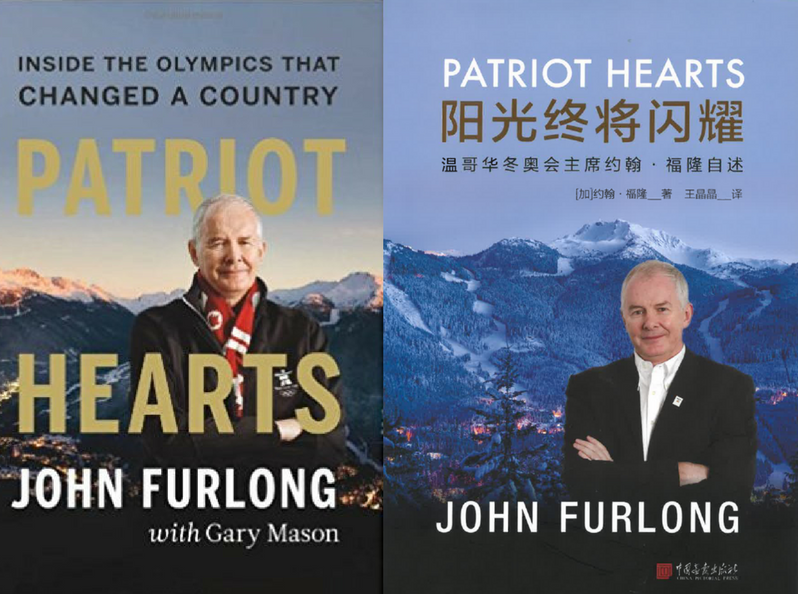
Covers of Furlong’s 2011 book and 2018 Chinese translation.
The concluding report said of the 18 interviews conducted, only six had been recorded. No charges were laid.
“Those findings were made even though witnesses interviewed had been asked very few questions about details and no follow-up interviews had been conducted.”
Except for Abraham, none of the individuals interviewed was told of the outcome or reasons for the lack of charges.
“Ms. Abraham received a letter saying there was not enough evidence for Crown counsel to recommend charges, however a RCMP file indicates: ‘In the end the Crown made no recommendations because they did not have intimate file knowledge but did say that there is a threshold that needs to be met for charge approval’.”
The filing alleged that Furlong was friendly with then Premier-Christy Clark and then-Attorney General Suzanne Anton, and that the RCMP afforded him special treatment because he had been the head of an Olympics that resulted in the biggest, most-expensive peacetime operation in Canadian history.
Two senior officers overseeing the investigation, Paul Richards and Rod Booth, were also senior officers in the Olympic security operation, the Vancouver 2010 Integrated Security Unit, but did not recuse themselves. Instead, the senior officers had significant influence over officers conducting the investigation, under their command.
The filing also said the complainants against Furlong were not treated the same as those who had complained against convicted junior hockey coach Graham James. The complainants against Furlong were indigenous and James’s victims were not.
“The complainants in the Graham James investigation did not experience the kind of adverse impacts experienced by the complainants in this case. Once identified, witnesses were interviewed promptly and thoroughly and were also supported. Those that reported abuse were kept informed about the investigation and the results.”
A June 29 statement from Lake Babine Nation Hereditary Chief Ronnie West said he gave an affidavit in May 2012 alleging he witnessed abuse by Furlong, but was never interviewed by the RCMP.
“We were characterized as liars. We are not liars,” West said. “What we said happened, happened and the RCMP didn’t investigate.”
During February’s 10th anniversary celebrations of Vancouver 2010, Furlong suggested the city bid for the 2030 Winter Olympics.
Support theBreaker.news for as low as $2 a month on Patreon. Find out how. Click here.
Canadian Human Rights Tribunal Woodgate Et Al v RCMP by Bob Mackin on Scribd









